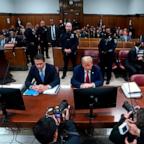U.S., foreign stocks plunge as financial problems spread
NEW YORK -- The stock market plunged precipitously Monday, with the Dow Jones industrials down as much as 700 points, as traders feared the financial bailout package would not pass the House.
As the vote was shown on TV, stocks plunged and investors fled to the safety of the credit markets on fears that the financial system would keep sinking under the weight of failed mortgage debt.
The Dow fell 705 points, then regained some ground to trade down about 500. The Standard & Poor's 500 index and the Nasdaq were both off more than 5%.
Credit markets were still tight, as investors in the U.S. grappled with whether the historic financial rescue bill would pass and whether it will work.
Jitters were only increased by news that Wachovia Bank would be acquired by Citigroup, making Wachovia the latest U.S. banking institution to be leveled by the credit crisis.
Overnight, global stock markets posted losses as investors watched failures in Britain and Belgium. Shares were down sharply in Europe with Britain's FTSE 100 down 5.3%, Germany's DAX index 4.2%, and France's CAC-40 5.0%.
Asian markets closed down 1.3% in Japan, 4.3% in Hong Kong and 2% in Australia.
Hugh Johnson, chief investment strategist at Johnson Illington Advisors, says the lukewarm response to the U.S. government's financial rescue plan is due largely to an array of unanswered questions.
"It's extremely complex, and it is happening very fast and if individual investors are bewildered they are not alone," says Johnson. "There is so much uncertainty. Will the House and Senate pass the bill? What will the final details be? That is why the market is so jittery," he says. "It's not good to have those questions when short-term credit markets are seizing up."
Frozen credit markets, which the government's plan is trying to fix, showed little signs of thawing Monday, says Bill Hornbarger, fixed-income strategist at AG Edwards.
The yield on three-month Treasury bills, considered a super-safe investment, plunged to 0.68% from 0.84% on Friday. At one point early Monday, the yield went negative — meaning investors were willing to pay the government a premium to stash their money in a super-safe short-term IOU.




